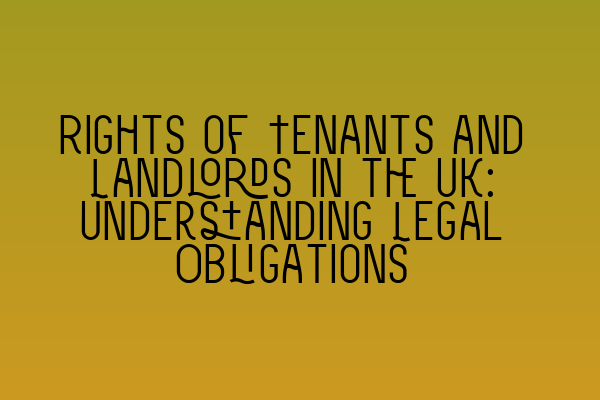Rights of Tenants and Landlords in the UK: Understanding Legal Obligations
As a tenant or landlord in the UK, it is crucial to have a thorough understanding of your legal obligations and rights. Whether you are renting a property or letting one out, staying informed about the relevant laws and regulations is essential to avoid disputes and ensure a smooth and successful tenancy.
In this blog post, we will discuss the rights and obligations that tenants and landlords have in the UK, covering various key aspects of property law. So, let’s dive right in!
1. Assured Shorthold Tenancies (ASTs):
The majority of residential tenancies in the UK are Assured Shorthold Tenancies (ASTs). These tenancies provide certain rights and protections for both tenants and landlords. It is crucial to have a written tenancy agreement that clearly outlines the terms and conditions of the tenancy, including rent, deposit, and responsibilities of both parties.
2. Rent and Deposit:
Tenants have the right to know how much rent they need to pay and when it is due. Landlords must provide tenants with a rent statement, either written or online, specifying these details. Additionally, landlords are required to protect the tenant’s deposit in a government-approved deposit protection scheme within 30 days of receiving it.
3. Repairs and Maintenance:
Landlords are responsible for keeping the property in good repair and ensuring that it meets certain safety standards. This includes maintaining the structure and exterior of the property, as well as ensuring that gas and electrical installations are safe. Tenants must promptly report any repairs needed to the landlord or letting agent.
4. Entry and Privacy:
Landlords must give tenants at least 24 hours’ notice before entering the property, except in case of an emergency. Tenants have the right to enjoy their property without unnecessary intrusion from the landlord. It is important for both parties to respect each other’s privacy.
5. Termination of Tenancy:
Both tenants and landlords have rights when it comes to terminating a tenancy. Tenants usually have the right to a minimum notice period, typically one month, before they can vacate the property. Landlords must follow the proper eviction procedures outlined by the law, and cannot terminate a tenancy without a valid reason.
It is important to note that the above points only provide a general overview of the rights and obligations of tenants and landlords in the UK. For a more comprehensive understanding, it is advisable to seek professional legal advice or consult the relevant legislation.
To further enhance your knowledge of property law and land law, SQE Property Law & Land Law offers excellent preparation courses for the Solicitors Qualifying Examination (SQE) 1 and SQE 2. These courses provide in-depth knowledge and guidance to help you excel in your legal career. Additionally, SQE 1 practice exam questions and SQE 1 practice mocks FLK1 FLK2 are available to help you test and strengthen your understanding of the subject matter.
To stay updated with the latest information regarding the SRA SQE exam dates, it is recommended to regularly check the SRA SQE Exam Dates page on our website.
In conclusion, understanding the legal obligations and rights of tenants and landlords is crucial for a successful and harmonious tenancy. By staying informed and seeking professional advice when needed, you can ensure compliance with the law and protect your interests as a tenant or landlord in the UK.
Sources:
– SQE 2 Preparation Courses
– SQE 1 Preparation Courses
– SQE 1 Practice Exam Questions
– SQE 1 Practice Mocks FLK1 FLK2
– SRA SQE Exam Dates
